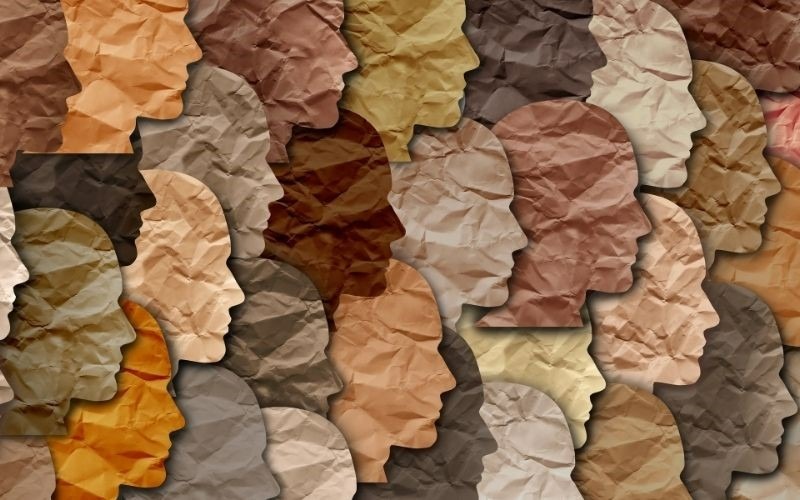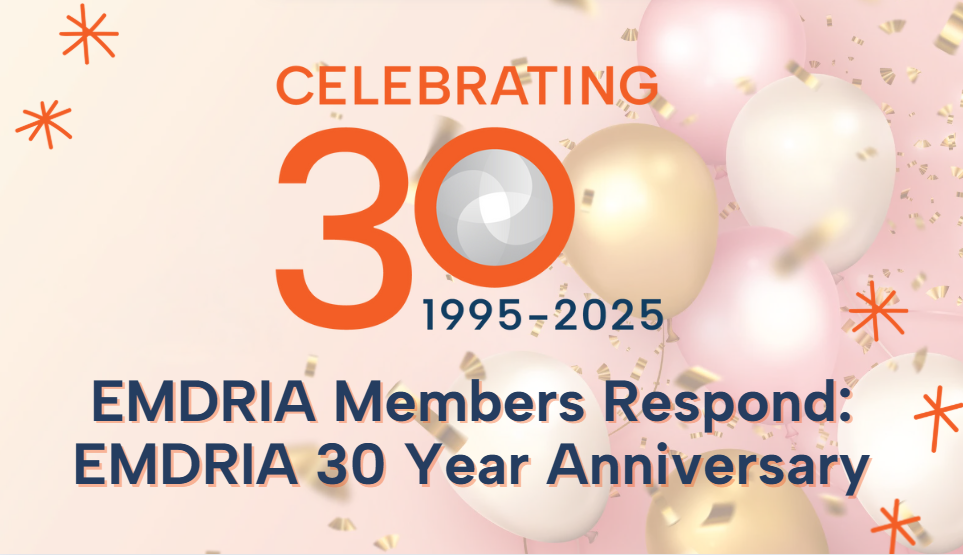EMDR therapists can celebrate Black History Month by intentionally using the lens of Community Cultural Wealth to identify internal and external resources in their clients. We asked EMDRIA members for video or written responses for the following:
“Describe some internal and/or external resources that you strengthen/install with your Black or African American identifying clients. How do you encourage them to embrace their Community Cultural Wealth?”
***NOTE: For closed captioning on the videos, play the video and click on the ‘CC’ icon in the lower right-hand corner. *** Dr. Lisa Battle-Gwathney, PhD, PCC “One of my favorite internal resources to install that exudes externally is the client’s choice. This may seem basic or small. However, one of the greatest gifts in our society is the power to choose. This is as simple as installing the client deciding the calm/safe state does not serve their needs. Additionally, installing the client’s choice to incorporate cultural practices such as prayer into the session. I believe the client’s system wants to heal, and I am only a facilitator. My best piece of advice for any clinician to embrace “Community Culture Wealth” is to listen to your client’s system and lean in.” *** Latasha Burnett, LMFT-S *** Amber Creamer, LPCC, LMFT, LPC *** Jessica Crunkleton, LMFT, LPC ***Ava Hart, LCSW, and Atia Hart *** Donna Hunter, CMHC “There’s the adage “A picture speaks 1000 words.” For example, Art Kane’s 1958 photo ‘A Great Day in Harlem’ captures 58 iconic Jazz musicians assembled on a Harlem stoop. Greats include Dizzy Gillespie, Count Basie, Thelonious Monk, Mary Lou Williams, and more … For me, this iconic photo highlights artists who thrived despite societal oppression. Since many of these musicians jammed and riffed together, it also conveys that oppression can’t hinder us from finding essential community and connection. Marilyn Frye defined oppression as a group phenomenon in which a network of social barriers and forces reduce and immobilize members of groups based on their identity. Invite clients to use photos to combat oppression and connect with positive bodily sensations. They can select the identity they’d like to strengthen with resources such as companionship, safety, support, or protection. After evaluating that bilateral stimulation is suitable, I like to create a slideshow, position my laptop in front of a lightbar, and have the client view the slideshow to take in the images with slow bls in the background ( or use the butterfly hug.) It’s one method to help clients notice, name, and nurture positive states in inhospitable environments.” *** Brittany A Johnson, LMHC “One of my favorite resources to use with my Black/African-American clients is to create a wisdom figure that encompasses cultural, historical, and strong features of other Black Americans. Microaggressions and systemic racism can feel like they are never-ending, so having this figure (or figures) can help with building your clients’ internal and external safety. When these skills are taught to other clinicians who teach their clients, or when clients teach others in their community, it builds the community’s cultural wealth. It follows the “Each one teach one” ideals.” ***Arielle Jordan, LCPC ***Lindsay Love, LCSW *** Dr. Londyn Miller, LMFT “I resource my Black clients in a myriad of ways. First, I help them explore their racial identity, including their attitudes and beliefs about it and in what context their beliefs may differ or fluctuate. Next, I use a culturally specific version of EMDR and other culturally sensitive interventions to help them understand and strengthen their racial identity. I enjoy helping my Black clients identify external resources that both serve and do not serve their positive racial identity. We explore how they can limit their exposure to stereotypes in the media (especially negative ones) and identify positive images and messaging about Blackness to which to expose themselves. Studies have shown that positive social support, creative cultural expression (ex, art, movement, theatre, and poetry), highlighting celebration and joy, and opportunities to show strengths, including service, leadership, and character, are protective factors that help Black people uphold a positive racial identity. (Turner et al, 2022). I embrace community cultural wealth by supporting and participating in the Black arts, Black-owned businesses, learning about African and Black history, visiting museums, unfollowing media which perpetuates negative and biased stereotypes of Black people and upholding a positive racial identity.” *** Dr. Chante Pantila, LPC *** Joanne Thomas, LPC “Resources that prove helpful for the BIPOC client to internalize and strengthen are developed individually based on the client’s background and experiences. Internal resources that may be strengthened include memories of supportive family members who have positive memories and have provided support during a struggle. Other internal resources might be envisioning what a healthy Black family structure might look like based on what they have seen previously by people around them. External resources that can be installed to strengthen the safe/calm place may include memories that provide cultural significance within the BIPOC community, such as Sunday family dinners or attendance/participation in church. To embrace Community Cultural Wealth, the clinician discusses and acknowledges what types of capital the client may have. This determination is based on asking probing questions. The client may have strength of family ties or sorority and fraternity affiliation. It may also include identifying matriculation in an HBCU or other educational aspirations. The BIPOC client might also be multi-racial, having more than one language they are fluent in. Therefore, embracing Community Cultural Wealth as a strategic pathway to assisting clients in developing the most viable resources is of the utmost importance. *** Jumai Usamatu, RSWResources
Anxiety & Depression Association of America. Black and African American Communities. https://adaa.org/find-help/by-demographics/black-african-american-communities Archer, D. (2020, Fall). Racial trauma, neurons, and EMDR: The path towards antiracist psychotherapy. Go With That Magazine. Open access: www.emdria.org/wp-content/uploads/2021/05/GWT.2020.Vol_.25.Issue_.3.RacialTrauma.ALL_.pdf Archer, D. (2021). Anti-Racist Psychotherapy: Confronting Systemic Racism and Healing Racial Trauma. Montreal, QC: Each One Teach One Publications. Ashley, W., & Lipscomb, A. (2020, Fall). Addressing racialized trauma utilizing EMDR and antiracist psychotherapy practices. Go With That Magazine. Open access: www.emdria.org/wp-content/uploads/2021/05/GWT.2020.Vol_.25.Issue_.3.RacialTrauma.ALL_.pdf Clearly Clinical. (2022). Lifting Black Voices: Therapy, Trust, and Racial Trauma (Ep. 95). Podcast featuring La Shanda Sugg, LPC, Dr. Tiffany Crayton, LPC-S, and LJ Lumpkin, LMFT. https://courses.clearlyclinical.com/courses/free-ceu-racial-trauma-therapy EMDRIA. Antiracism Resources. www.emdria.org/publications-resources/practice-resources/antiracism-resources/ EMDRIA. (2022). Antiracist EMDR Therapy with David Archer. Lets Talk EMDR Podcast Episode 10. https://www.emdria.org/podcast/antiracist-emdr-therapy/ EMDRIA. (2021). Black History, Racial Trauma, and EMDR. Focal Point Blog. https://www.emdria.org/public-resources/black-history-month/ EMDRIA. (2023). Celebrating Community Cultural Wealth. Focal Point Blog. https://www.emdria.org/blog/celebrating-community-cultural-wealth/ EMDRIA. Diversity and Cultural Competence Association Policy. EMDRIA. (2022). EMDRIA Members Respond: How Can EMDR Therapists Increase Safety for BIPOC Clients? Focal Point Blog. https://www.emdria.org/public-resources/bipoc-mental-health/ EMDRIA. (2022). EMDRIA Members Respond: How Can the Field of EMDR Therapy Increase Access of Care for BIPOC Individuals? Focal Point Blog. https://www.emdria.org/public-resources/emdria-members-respond-how-can-the-field-of-emdr-therapy-increase-access-of-care-for-bipoc-individuals/ EMDRIA. (2023). EMDRIA Members Respond: Identity and Representation for Black History Month. Focal Point Blog. https://www.emdria.org/blog/emdria-members-respond-identity-and-heritage-representation-for-black-history-month/ EMDRIA. EMDR and Diversity, Community, and Culture Online Community. EMDRIA. EMDR therapy and parents with Mercedes Samudio, LCSW. Let’s Talk EMDR Podcast Episode 3. https://www.emdria.org/letstalkemdrpodcast/ EMDRIA. EMDR therapy, PTSD, and treating black men and adolescents with Dr. Allen Lipscomb. Let’s Talk EMDR Podcast Episode 2. https://www.emdria.org/letstalkemdrpodcast/ EMDRIA. Race, Culture, and Ethnicity OnDemand Education Opportunities. https://www.emdria.org/emdr-training/continuing-education/emdria-on-demand/?fwp_practice_methods=dei-idea Hart, A. Trauma Bonded Sisters. Justice Based Workshops for Black Women. https://drive.google.com/file/d/1yLLgNABrtt3i-W6T0yUB_CpRhQCxTi3X/view?usp=sharing Hernandez, C. (2020, Fall). SPACEHOGS make a difference. Go With That Magazine. Open access:www.emdria.org/wp-content/uploads/2021/05/GWT.2020.Vol_.25.Issue_.3.RacialTrauma.ALL_.pdf Levis, R. V. (2017). Placing Culture at the Heart of EMDR Therapy. In Nickerson, M. I. (Ed.), Cultural Competence and Healing Culturally-Based Trauma with EMDR Therapy: Innovative Strategies and Protocols (pp. 97-112). New York, NY: Springer Publishing Co. Levis, R. V., & Siniego, L. B. (2017). An Integrative Framework for EMDR Therapy as an Anti-Oppression Endeavor. In Nickerson, M. I. (Ed.), Cultural Competence and Healing Culturally Based Trauma with EMDR Therapy: Innovative Strategies and Protocols (pp. 79-96). New York, NY: Springer Publishing Co. Mental Health Alliance. Black and African American Communities and Mental Health. www.mhanational.org/issues/black-and-african-american-communities-and-mental-health National Alliance on Mental Illness (NAMI). Your Journey: Black/African American. www.nami.org/Your-Journey/Identity-and-Cultural-Dimensions/Black-African-American Nickerson, M. I. (2017). Cultural Competence and Healing Culturally Based Trauma with EMDR Therapy: Innovative Strategies and Protocols. New York, NY: Springer Publishing Co. Smith, L., Proctor, G., & Akondo, D. (2021). Confronting racism in counselling and therapy training – Three experiences of a seminar on racism and whiteness. Psychotherapy and Politics International, 19(2), e1579. Open access: https://doi.org/10.1002/ppi.1579 Turner, E. A., Harrell, S. P., & Bryant-Davis, T. (2022). Black Love, Activism, and Community (BLAC): The BLAC model of healing and resilience. Journal of Black Psychology, 48(3-4). https://doi.org/10.1177/00957984211018364 Urdaneta, V. (2020, Fall). Engage in the conversation of race and racism with “Hot chocolate and cheese:” An idea you can implement. Go With That Magazine. Open access: www.emdria.org/wp-content/uploads/2021/05/GWT.2020.Vol_.25.Issue_.3.RacialTrauma.ALL_.pdf Washington, J. T. (2020). Examining the historical and present-age impact of racism in the United States of America through the arts, aesthetic education, and transformative learning theory: Empowering social work students to effectively discuss racism and provide best practices with African Americans and other people of color (Publication No. 139) [Doctoral dissertation, University of Pennsylvania, School of Social Work]. https://repository.upenn.edu/edissertations_sp2/139/Back to Focal Point Blog Homepage
Additional Resources
If you are a therapist interested in the EMDR training:- Learn more about EMDR at the EMDRIA Library
- Learn more about EMDR Training
- Search for an EMDR Training Provider
- Check out our EMDR Training FAQ
Date
February 5, 2024
Contributor(s)
Lisa Battle-Gwathney, Latasha Burnett, Amber Creamer, Jessica Crunkleton, Ava Hart, Atia Hart, Donna Hunter, Brittany A. Johnson, Arielle Jordan, Lindsay Love, Londyn Miller, Chante Pantila, Joanne Thomas, Jumai Usamatu
Topics
Racial Trauma
Client Population
Racial/Cultural/Ethnic Groups
Practice & Methods
DEI/IDEA, Resourcing





